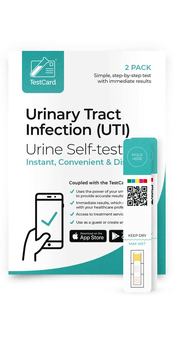Medication features
Use an instant at home UTI Dip test to see if you have a UTI
TestCard is an easy to use, at-home dip urine Urinary Tract Infection (UTI) test kit. When coupled with our smartphone app, it provides immediate accurate test results from the comfort of your own home.
TestCard is CE marked for use as a medical device in the UK. Our test is as accurate as a urine test performed in a clinic.
- Over 99% Accurate
- Instantly test and treat your UTI
- CE Marked in the UK
- Buy With Confidence From UK Registered Pharmacy
Overview
Buy Urine Self-Testing Kit Online - Instant Dip Test
1. Order your TestCard
2. Take your test
3. Get results within seconds
If you have a UTI, our medical team can recommend and supply you with an appropriate treatment for discreet next-day delivery.
TestCard UTI Test Kit
TestCard is an easy to use test kit for UTI that includes two test strips. You use it with a free smartphone app to see immediate, clinically accurate test results from the comfort of your own home.
All the instructions are in the app. Results are private and securely stored on your phone. The power of your phone creates a clear result to tell you if you have a UTI.
What is the Testcard UTI Test & Treat Service?
Our UTI Test & Treat Service is available UK wide and allows you to test for a urinary tract infection (such as cystitis), and treat it, without necessarily needing to see your GP. You can use the test kit at a time and in a place to suit you, and, once you’ve completed the test, if you have a positive result you can either order your prescription via the TestCard app, approved by our pharmacist and delivered to your door, or share your results with your pharmacist or doctor to access treatment if required.
Who can use the Test & Treat Service?
Anyone can use the TestCard UTI Test Kit for a quick and accurate test result. The Test and Treat service is for women ages 18-65 who have symptoms of a UTI, such as burning pain when passing urine, cloudy urine, or needing to pass urine more often than usual. The Test and Treat service is specifically for patients with an uncomplicated UTI and you may be asked to seek care from your GP if you have any additional conditions, for example; Pregnancy, Lactation, Immunosuppressed, renal impairment.
For more information on Cystitis, visit our page here.
About TestCard
Why should I take a UTI test?
UTIs are easy to diagnose and treat once you're aware you have one, so speaking to a doctor or taking a test if you have symptoms is very important. This is because UTIs can lead to complications if they're left untreated for too long. So, if you're worried you might have one, you should always get tested so you can get the right treatment quickly.
UTIs are far more common than you think, with between 10-20% of women likely to experience the symptoms of a UTI. And, although most aren't dangerous if they're treated early, they can lead to serious health problems when left undiagnosed. For example, if left untreated, the bacteria that causes UTIs may spread to other parts of your body, such as your kidney, leading to long-term damage and possible kidney failure in the future.
If you're experiencing the symptoms of a UTI, it's always best to take a test or speak to your doctor for advice.
What are the symptoms of a UTI?
UTI’s happen when certain bacteria make their way into your urinary tract. In most cases these bacteria are the same ones that are found in your bowels, but other types of bacteria (like sexually transmitted ones) can also cause UTIs. If the bacteria enter your bladder or kidneys, they can cause an infection. UTIs are more common in women than men. We think this is partly because women have a shorter urinary tract, so the bacteria does not need to travel as far to infect the bladder or kidneys.
Some of the common symptoms of UTIs include:
- having to pee more frequently than usual, especially at night
- a burning or stinging sensation when you pee
- cloudy urine
- blood in your urine
- feeling tired and feverish
- pain or discomfort in your belly or in your back
In mild cases, UTI symptoms will clear up without treatment. However, if you get UTIs frequently, or your symptoms are more severe, you should speak to a doctor to get antibiotic treatment. Left untreated, bladder and kidney infections can cause serious health problems.
UTI symptoms usually go away within 24 to 48 hours after treatment begins, though if you have a kidney infection, it may take 1 week or longer for symptoms to clear up after treatment.
When should I get tested for a UTI?
You should get tested for a UTI as soon as you think you have one or start showing symptoms. The earlier you test and get treatment, the less likely you are to get any further complications from the infection. It’s particularly vital to get tested if you notice that your symptoms worsen or aren’t improving after a few days.
If you get UTIs regularly, you should speak to your doctor to make sure there’s nothing else causing them. You should also speak to your doctor if you’re a man with symptoms of a UTI, have UTI symptoms following surgery, or your symptoms continue after getting treatment.
How does TestCard UTI work?
TestCard is a convenient method for testing for a UTI from your home with your mobile phone. It works similarly to UTI dip tests or other testing strips you might have used before but gives you an easy to read test result while giving our doctors enough detailed information to provide a diagnosis.
Your TestCard works in the following way:
- Each TestCard contains a set of UTI test strips
- Use a clean container to collect a sample of your urine. Do not contaminate your sample. Make sure your urine doesn’t touch anything apart from the clean container.
- Dip your TestCard UTI strip into your urine sample. Open the TestCard app on your phone, and use it to scan the QR code on the UTI strip.
- You will receive your test results on your phone in seconds, which our doctors can use to provide a diagnosis.
- If you are diagnosed with a UTI, our doctors will provide you with expert advice and recommend treatment if required.
- We are always here to help if you have any questions about your diagnosis or treatment. Simply message our medical team for free through your patient account.
TestCard At-Home UTI Test FAQs
What is Cystitis and what are it's causes?
Cystitis is the inflammation of the bladder wall. This can be caused by a bacterial infection (usually by E. coli which lives harmlessly in the intestine) or from physical irritation or bruising during sexual intercourse. The bacteria move upwards via the urethra (the tube that connects the bladder to the outside world) and attaches to the bladder wall causing the pain, frequency and discomfort associated with cystitis.
How infectious is Cystitis?
Cystitis is an infection, however it cannot be transmitted like the common cold. Cystitis is not contagious; you do not need to worry about passing it on to others.
What is the treatment for Cystitis?
There are a number of different treatments for cystitis.
You can use simple sachets that make the urine less acidic and stop the burning sensation e.g Cystopurin, Cymalon, Potassium Citrate Mixture & Canesten Oasis.
As cystitis is a bacterial infection it can also be treated using antibiotics; Trimethoprim is the most common. It is eliminated from the body in the urine, therefore it occurs in high concentrations exactly where it is needed for effective treatment. Trimethoprim is available to treat cystitis in women through our Online Pharmacy. Other antibiotics can be used to treat cystitis if Trimethoprim is not suitable, these can be prescribed by your GP.
What are the symptoms of Cystitis?
If you have had a urinary tract infection before you may recognise the symptoms. These can include:
- a burning or stinging sensation when you pass urine.
- the urgency and increased frequency of passing water.
- only being able to produce small amounts of urine.
See the 'Symptoms' section above for a detailed overview of the symptoms of cystitis.
When should I feel better after taking antibiotics?
The burning sensation, frequency of and the urgency of passing urine can start to subside in as little as a few hours but will usually resolve after a day of starting antibiotic treatment. After the initial symptoms have resolved you maybe left with a few days of irritation. You should never stop your antibiotic treatment early, even if you begin to feel better.
What can I take for the pain associated with Cystitis?
Over-the-counter painkillers, like ibuprofen, aspirin and paracetamol, are fine for treating the pain of cystitis. These can be taken with trimethoprim but always check with your pharmacist or GP if you are on any other medicines.
What do I do if I don't feel better after taking antibiotics?
Trimethoprim is eliminated from the body in the urine, this means it is present in large concentrations exactly where it is needed. It is normally prescribed straight away, without sending a sample off for analysis because it works so quickly.
If you have not seen an improvement in your symptoms within 48 hours you need to see your doctor face to face. Your infection may be resistant to the first line treatment of trimethoprim and they can send a fresh urine sample off for analysis to identify the bacterial cause of your infection. Your cystitis can then be accurately treated with a different antibiotic to which there is no resistance.
When I take antibiotics I sometimes get Thrush, why does this happen?
Thrush is caused when the naturally occurring yeast, Candida Albicans, overgrows in the vagina. This usually happens after a course of antibiotics because they reduce bacteria in the vagina that regulate the yeast. As the candida over grows the symptoms of thrush develop. This is completely normal and is easy to treat with a Fluconazole 150mg Capsule.
When I take antibiotics I sometimes get Thrush, why does this happen?
Thrush is caused when the naturally occurring yeast, Candida Albicans, overgrows in the vagina. This usually happens after a course of antibiotics because they reduce bacteria in the vagina that regulate the yeast. As the candida over grows the symptoms of thrush develop. This is completely normal and is easy to treat with a Fluconazole 150mg Capsule.
Can I treat Cystitis with cranberry juice?
Cranberry juice does not cure or treat the symptoms of cystitis but it is thought to stop the bacteria from attaching to the wall of the bladder and urethra. This makes is more useful for prevention rather than cure.
The evidence for this is limited with some studies showing that it does work and others showing it had little effect.
TestCard At-Home UTI Test Reviews
Confirm TestCard At-Home UTI Test treatment selection
| One Size | £11.99 |

















